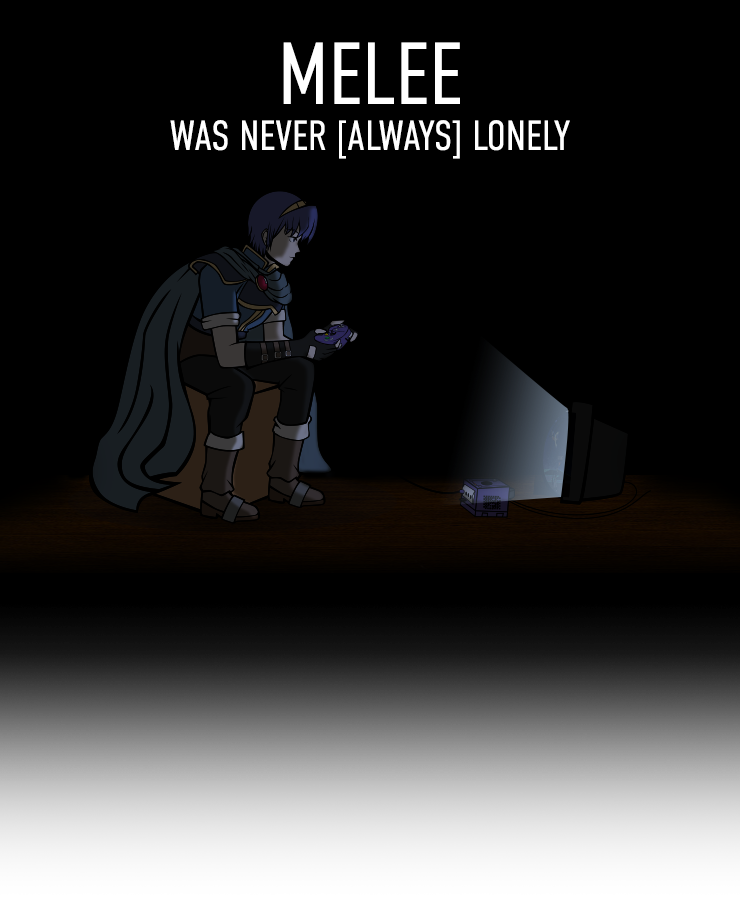Melee was Never/Always Lonely

Melee was Never/Always Lonely
“And if the snow buries my / My neighborhood / … / Then I’ll dig a tunnel / From my window to yours.” Arcade Fire, "Tunnels." Funeral
If Melee is one thing, it’s grassroots. Community, for us, is everything—it’s how we organize, compete, grow, and survive. Growing up in Melee circles, I have seen firsthand how the community sticks together: from a $94,600 spirit bomb for a spot at EVO 2013, to the efforts of small tournament organizers trying to raise up their local scenes. Yet, if you’re a competitor, you know that a unique loneliness is just as core to the game as community is.
It comes after the bracket finishes, after all of us begin our awkward shuffle out of the venue, after the post-tournament food run ends, and after all of the laughter melts away into echoes in your ears.
When you get into your car and get ready to go home, it begins.
THE RIDE HOME
Loneliness is expressed in many different ways, but the definition that best suits the car ride home is “being without company.” The car ride home is, for many Melee players, not without physical company. (None of us are strangers to carpooling, after all.) No, the “company” we lack on the ride home is that of our tournament fate.
There is something beautiful in the fact that each player in a bracket has a unique fate. Even with the same placing, no two players will have the same tournament run. Further still, no two players will have the same tournament experience. We will each win in our own way and lose in our own way, regardless of the performance of others. You could be in the same car with the champion of the entire event as easily as the person who went 0-2.
In the realm of the bracket, there will never be a person that shares your exact experience. You sit alone in that car, contemplating every single mistake you made, the tough losses and glorious wins, the moments that are yours to hold and nobody else’s. One person’s greatest upset is another person’s greatest choke. Both the winner and the loser must process this equally—they share no experience other than their mutual participation in the game. The ride home is the place where that processing confronts you.
During the ride home, you are forced to look at yourself in the present: at that moment, you must hold your result—regardless of beliefs about potential or dreams about the future.
It is a mirror, and it is made for one.
DISTANCE
Of course, bracket fate is not the only isolating factor in Melee. Without a built-in online system, players are separated geographically and forced to travel across the country for majors. Just look at the location of the major tournaments:
- Riptide - Ohio
- Mainstage - California
- Super Smash Con - Virginia
- The Big House - Michigan
This problem has consistently kept good players from traveling, and is a large reason why Melee has so many “hidden bosses.” Locals are filled with these demigods, saving up to cover travel costs, waiting for their breakthrough at a major.
One genius coder and many hours later, rollback netcode releases for Melee. An entire generation of Melee players is created—one that has never experienced the ride home from tournaments, the struggle of travel, or the pressure to perform at the singular major you get to attend every year. A generation more connected to each other than ever but more isolated from Melee’s spirit.
I would like to present to you a theory: without that same physical isolation and distance that has caused so much doubt and grief, our connections wouldn’t be nearly as deep—and Melee would not have lived. There would be no Wombo Combo, EVO spirit bomb, or any of the iconic moments we have today.
CONNECTION
Compared to other esports, Melee was... small. For years, we would fight over scraps, enduring hours of driving to win meager pots. Why?
Melee—even with all of its isolation—is fundamentally connected. Our very culture is shaped by the fact that we were forced to play on LAN. From competing side-by-side in front of tiny CRTs, to joining together in the crowd to cheer on our favorite players, Melee is a game where you view your opponent as they truly are: in-game and out. There is no anonymity on LAN, no smurf to hide behind. The isolation brought us together by forcing us to interact in a space that fostered meaningful and healthy relationships.
A famous saying in the Melee community is that you never truly “quit the game.” What keeps us coming back is not just the game itself: it’s the sense of belonging. Melee is a game where you can find people. Through this game, I have found people I work with today. I have found people that inspire me to continue growing, both as a person and as a player. We find these people because we are forced to both interact and improve with them, due to the close-quarters nature of the scene and the way the game is played. Our sadnesses are shared, our joy is mutual.
At the most fundamental, important level, Melee is a game where you can find a friend.
Smash Summit 11, grand finals. It is the largest prize pot in Melee history.
SCSA West Coast Circuit, winners finals. The pot is $225.
What unites these two sets is commentary from Brandon “HomeMadeWaffles” Collier, a legend of the game and pioneer of Melee casting. The SCSA set is from 2008, while the Smash Summit set is from 2021. In the SCSA set, HomeMadeWaffles jokes that the two players are fighting their hearts out for the “70% of the $45.”
13 years later, one of those same players, Joseph “Mang0” Marquez, would be fighting for that same 70%. This time, it would be for $45,000.
What makes this so beautiful is not the sheer coincidence of it all: the same player, the same number, the same commentator. The beauty in this moment is that Mang0 is still playing, HomeMadeWaffles is still commentating. Melee does not create passing associations: it creates bonds lasting over a decade.
The ride home might not be so lonely after all.
THE NIGHTCLUB
As the era of Netplay finally comes to a close, new players are starting to enter LAN tournaments. They will endure new trials: a heightened pressure to perform, rowdy crowds, and lonely drives home. One of these recently-opened LAN tournaments is The Nightclub, a New York weekly featuring top talent such as Cody “iBDW” Schwab and Toussaint “2Saint” Turnier.
The Nightclub is professional. It boasts high-end monitor setups, full UCF, audio splitters, and a sleek logo on top. What I love about The Nightclub, however, is not the professionalism—it’s the personality.
What I love about The Nightclub is that it embodies the spirit of personal connection that Melee thrives in. During the online era, where your opponents were faceless and you were fighting alone, many players were alienated by the lack of personal interaction. For almost two years, our desire for a social outlet has been building. What I love about The Nightclub is that it is a space specifically designed to let out that energy.
No, I’m not talking about iBDW getting comically drunk and getting third place. I’m talking about the raw excitement coming from the venue during the nail-biters.
The commentators alternate between denial and screaming. Nervous squeals can be heard from the crowd, so loud they bleed into the microphone.
(From the stream perspective.)
(From the live perspective.)
At the end of another set, everyone is smiling. Some people in the crowd raise their fists together. “Let’s go Alex!” one of the spectators cheers. Although they competed just hours prior, they are still able to gather together, laugh together, and cheer on their friend. For almost two years, that has been an impossibility.
Building community
Of course, this is not without the conscious effort of a few dedicated tournament organizers. One of these is Justin “DarkGenex” Cohen—a content creator, T.O., and high-level player.
[Logan] Do you feel like The Nightclub has provided a good place for players to feel connected to the community?
[DarkGenex] At the Nightclub on Tuesday, 8/3, an unseeded Jigglypuff player by the name of Drew entered the tournament with only 1 prior other IRL event attended. By the end of the event, he amassed wins over Dr. Doink and Jib, two players with top 100 wins. Prior to this event, he had been playing the game for about 4 months.
I only know that he had been playing this game for 4 months because several people went up to me to ask, “Who is Drew?” or to tell me that he had been playing for only 4 months and had beaten all of these players. Throughout the day, I saw several people talking to him from different groups. By the end of the night, he came up to the T.O. desk to thank us for the event and for the experience. If a player like Drew can so quickly become a part of the NYC Melee community, I think I can pretty confidently believe that The Nightclub has provided a good place for players to feel connected to the community.
[Logan] Have you helped foster connection in The Nightclub?
[DarkGenex] There’s always the stereotype of Smash venues being in crowded basements or cramped rooms. These sorts of venues can be a turn off to newer players, who are more used to playing in the comfort of their homes. OS NYC, our lovely venue in Chinatown, is the antithesis of what you’d expect out of a normal smash venue. The venue itself is beautiful on the inside, spacious, clean, and provides plenty of friendly setups and places for players and spectators to watch the streamed sets with their friends. Comfort at any event starts when you walk into the venue, and OS NYC does a spectacular job at making that first impression.
There are a handful of things we’ve done and will be doing to continue to foster connection within The Nightclub for players of all skill levels. First, we have name tags provided at the front desk. On these you can write your name, tag, pronouns, and any other information about yourself you’d like to include. We’ve also included a big T.V. in the front of the T.O. desk, with many seats to watch the stream with your friends. Spectators are allowed to watch and play past the bracket cap; we’ve had people who didn’t even know people still played Melee come to The Nightclub to watch matches and learn about the game. In the future, we will be creating a Discord server for The Nightclub to provide a place for players to talk to each other, play games, and find that sense of community.
We, as Melee players, are just individuals. Our game is one of isolation, spread all across the world, only recently getting a functioning netcode. Try as we might, we cannot be a community by ourselves.
What we can do, is foster connection. We can create safe, welcoming environments where players like Drew can find a home. We can build lifelong friendships, become business partners, grow together, laugh together, and play Melee together.
What I love about The Nightclub is that, for at least one player, it made the ride home less lonely. The intricate weaving of lifelong bonds is only beginning for a new generation of players - one that may experience the isolation of Melee as a fragmented moment, and not a driving force pushing our community to grow and thrive. Melee is a naturally lonely game. At the Nightclub, many players learned that it doesn’t have to be.
That is something to be celebrated. Connection is an ongoing labor of love, undertaken by individuals all over the community. It is also how we grow - going from basements to real venues, laggy Dolphin connections to top of the line rollback netcode, from 0-2 newcomer to something more. Twelve years from now, these new players entering the scene will be our community leaders, tasked with creating that same space they were previously given.
Perhaps, one will be fighting in the grand finals of EVO 2033, with HomeMadeWaffles on commentary. Mang0 will still be where he thrives - on the opposite side of the stage, playing his heart out. Maybe, just maybe, they will remember that they were once fighting for 70% of the $45 - and share a laugh.
Writer // Logan "Logan" Dunn
Illustration // Paula Valbuena
Graphics // Justin Amponin
Editors // Austin "Plyff" Ryan // Indu "Xaafira" Reddy












